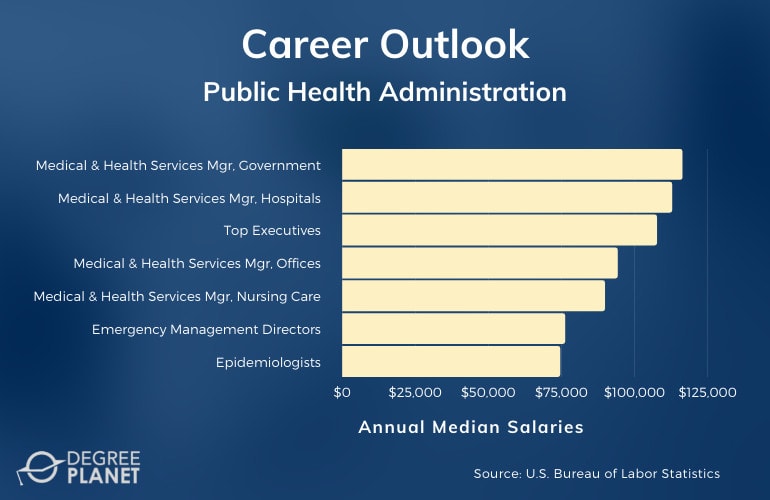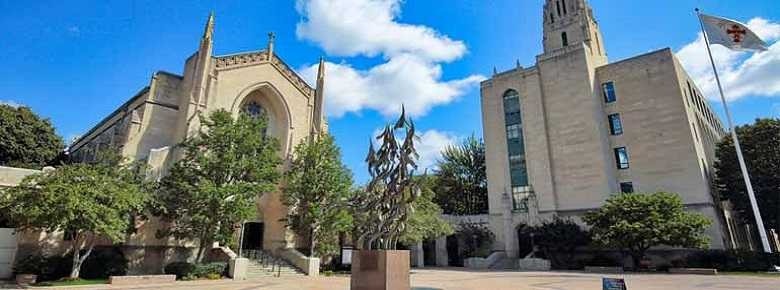If you are passionate about building and protecting community health or leading teams of healthcare providers, you might consider earning an MPH MHA dual degree.

This dual degree is also a strategic option for anyone who is interested in public health as well as the management of healthcare organizations.
Editorial Listing ShortCode:
A dual masters in public health and healthcare administration is applicable to jobs in a variety of areas, including medical management, community outreach, and health information services.
MPH MHA Dual Degree Programs

A dual degree program provides the opportunity to simultaneously earn credentials in two different fields. This option allows you to obtain two degrees in a shorter amount of time and can widen the range of available career options in the future.
Students that enroll in dual degree programs often choose to study related subjects from the same field. This can help you expand your knowledge base and broaden your job opportunities post-graduation. In an MPH/MHA dual degree program, you can earn a Master of Public Health and a Master of Healthcare Administration together.
Editorial Listing ShortCode:
While an MHA will guide you through the various aspects of managing a healthcare program, an MPH will focus on the study of diseases in specific communities and public health policies. As you develop your expertise in both public health and healthcare administration, you may be eligible for various leadership roles within these fields.
What Is an MPH Degree?

A Master of Public Health (MPH) degree program focuses on the spread of disease and the overall health of different populations across the globe.
You can learn to create and implement successful community health programs as well as evaluate and change existing programs. You can also choose to concentrate on a specific area within this field of study. Common areas of focus include epidemiology and biostatistics.
Many MPH graduates go on to work in government roles related to public health, such as health informatics specialists or epidemiologists. Overall, MPH degrees are centered around helping people in various communities by developing solutions to health-related issues.
If you are dedicated to serving your community and are interested in addressing a particular health concern, such as prescription drug overdoses or food safety, this may be a useful degree for you to pursue.
What Is an MHA Degree?

A Master of Healthcare Administration (MHA) degree can help prepare you for work in healthcare management.
Graduates from this program tend to leave with a deeper understanding of marketing, research, and management as they relate to healthcare services. The study of specific ethical and legal rules and regulations surrounding the healthcare industry is also included in this degree program.
Editorial Listing ShortCode:
Professionals who earn an MHA often pursue careers in healthcare administration or management. For instance, some might work as hospital administrators or medical and health services managers. This degree can be lucrative since it prepares graduates for administrative and leadership roles within the healthcare industry.
Public Health Administration Careers & Salaries

A dual MPH MHA degree can open up many career options in the realm of public health administration. According to the Bureau of Labor Statistics, here are some careers related to the fields of public health and healthcare administration, along with their median salaries.
| Careers | Annual Median Salaries |
| Medical and Health Services Managers — Hospitals |
$119,450 |
| Medical and Health Services Managers — Government | $117,000 |
| Top Executives | $98,980 |
| Medical and Health Services Managers — Offices of Physicians | $98,230 |
| Medical and Health Services Managers — Nursing and Residential Care Facilities | $83,550 |
| Epidemiologists |
$78,830 |
| Emergency Management Directors | $76,730 |
| Social and Community Service Managers | $74,000 |
| Health Education Specialists | $60,600 |
| Medical Records and Health Information Specialists | $46,660 |
With a wide range of possible salaries and a growing job market, an M.H.A./M.P.H. dual degree can also provide many interdisciplinary career options.
MPH-MHA Dual Degree Curriculum & Courses

While every university will be unique in the curriculum they offer, there are a number of standard classes offered in accredited institutions. Here are some of the courses that you will likely take as you pursue your MPH-MHA dual degree:
- Epidemiology: You’ll study disease patterns and analyze spread through human populations in addition to learning to develop and implement effective treatment plans.
- Biostatistics: You’ll learn how to apply basic statistical analysis to common public health dilemmas and decisions.
- Health Policy Management: You’ll learn how our healthcare system operates and the policies which impact public access to care.
- Health Promotion and Management: This course is an exploration of human behavior related to healthcare and how to analyze and create health promotion plans.
- Environmental Health: You’ll study how our environment impacts human health.
- Hospital Organization: You’ll learn how to provide high-quality care to patients in a hospital setting.
- Clinical Management: This course covers the practical knowledge needed to manage a clinical program.
- Healthcare Ethics: You’ll examine and analyze the ethicality behind different forms of research in healthcare, such as informed consent.
- Health Finance: You’ll explore the financial dilemmas and questions in healthcare.
- Healthcare Data Analytics: You’ll learn to use data to analyze information and create real-world plans and solutions.
The courses you take can vary depending on your specific area of focus within the fields of public health and health administration.
Dual MPH/MHA Degree Programs Pros and Cons

There are a number of pros and cons to pursuing a joint MPH MHA program.
Pros:
- Wider variety of career options. Receiving advanced training in both public health and healthcare administration can often help you qualify for a wider selection of jobs. Having two degrees may also help you stand out to potential employers.
- Can acquire more skills and information. Naturally, receiving a quality education in two fields means that your knowledge base can expand. Gaining expertise in two fields can also help you develop specialized skill sets.
- Can earn multiple degrees in less time. Dual degree programs enable you to earn two degrees more quickly than it would take to earn them separately. Depending on the program you choose, you may save as much as 2 years of schooling with a dual degree.
Cons:
- Heavy academic workload. Pursuing two masters degrees means almost double the coursework. A joint curriculum, though, will often have some classes count toward both degrees.
- Higher financial cost. Since there are more classes required and more degrees earned, dual degree programs often cost more than a single graduate program.
- More difficult admissions process. Dual MPH MHA programs often have many applicants, making admissions competitive. In addition, you may be required to send in two applications, one for each grad program.
There may be additional pros and cons specific to your particular situation. You can consider the most important determining factors in your own life as you decide whether a dual degree program is right for you.
Admissions Requirements

Admission requirements for MPH/MHA dual degree programs vary between schools, but here are several items that are commonly requested during the application process:
- GRE or GMAT scores (only some schools require them)
- Bachelor’s degree
- Transcripts
- Relevant coursework or experience
In addition to these requirements, many schools ask you to pay a small application fee or request letters of recommendation as a testament to your character. It’s beneficial to research the application guidelines for the specific schools you are considering.
Accreditation

To earn recognition for providing high-quality educational instruction and materials, a school can choose to undergo a review conducted by a group of internal employees and external members.
When a school successfully meets a certain set of educational standards, it is awarded regional accreditation. Accreditation is important for several reasons. It ensures that the education you receive is of good quality and will meet industry standards in various fields.
Editorial Listing ShortCode:
Many employers want to know that you’ve received the necessary skills and information from your program before considering you for hire. In addition, certain forms of financial aid are also only given to students who attend accredited institutions. You can visit the US Department of Education’s website to check the accreditation status of your schools of interest.
Financial Aid and Scholarships

It may be useful to review your various financial aid and scholarship options as you pursue joint MPH degrees. Federal aid is provided by the federal government, and the amount is determined by individual need. In order to learn how much assistance you qualify for, you can fill out the Free Application for Federal Student Aid (FAFSA).
State government aid is also provided to qualifying students. The amount of state assistance given is dependent on several eligibility criteria. Some employers also have an education benefit included in their compensation package that could provide tuition assistance.
Most universities have a number of scholarships available for prospective students as well. You can learn more by researching these programs for your specific schools of interest.
MPH or MHA, Which Is Better?

There are many advantages to both an MPH and an MHA. Here are some of the key differences between them:
- Master of Public Health: An MPH program’s goal is to build knowledge related to public health and the spread of diseases. You can study the health of a variety of populations and learn effective strategies for preventing disease and protecting communities.
- Master of Healthcare Administration: An MHA program’s goal is to give you the opportunity to build management and leadership roles within the healthcare industry. You can study how to improve health services and how to apply business strategies to healthcare organizations.
Some students also elect to earn dual MPH degrees, choosing to earn an MHA at the same time. Joint degree programs can help you expand your job options, grow your knowledge in complementary fields, and work toward an interdisciplinary career.
Can You Get Two MPH Degrees?

If you are interested in two specific areas of focus within the larger Master of Public Health degree umbrella, you can choose to complete a double major. In an MPH double major program, you will earn one masters degree with two concentrations, such as health education and biostatistics, for example.
In comparison, a dual degree is when you earn your MPH in addition to a masters degree in another field. Completing two degrees together, like an MPH and an MHA, will consist of studies in two separate fields and will result in earning two masters degrees.
What Makes More Money, MPH or MHA?

Overall, healthcare administration careers tend to earn more than public health careers. Potential salaries for careers in these fields will vary, though, between companies and positions. An MHA will often lead to more managerial and leadership roles within healthcare.
According to the Bureau of Labor Statistics, the median salary for medical and health services managers is $101,340 per year. Alternately, professionals who earn their MPH often pursue careers related to managing public health and studying disease patterns, such as epidemiologists. The median annual salary for epidemiologists is $78,830 (Bureau of Labor Statistics).
What Can You Do with an MPH and MHA Joint Degree?
An MPH MHA joint degree can lead to a variety of career opportunities. The Bureau of Labor Statistics lists healthcare CEOs, medical and health services managers, and epidemiologists as some of the highest paying jobs in these fields.
Editorial Listing ShortCode:
This can also be a beneficial dual degree to earn if you have a specific area of interest related to public health or healthcare management. Many professionals who follow this path go on to find jobs in healthcare administration or management as well as health education and community outreach.
How Long Does It Take to Get an MPH/MHA Dual Degree?

A masters program that consists of 36 credits and don’t include a thesis requirement may be completed in 1 year with full-time, year-round studies. It generally takes 2 to 3 years to complete an MPH/MHA dual degree program with full-time enrollment.
A dual program often involves a joint curriculum, which means some courses may count toward both degrees. This can allow you to earn 2 degrees in less time than if you were to earn them separately. Completing a thesis requirement or attending part-time are both factors that can extend the length of a program.
What’s the Difference Between an MPH vs. MHA Degree?
While an MPH and an MHA program both study issues related to health, there are some differences in the content as well as the common careers students pursue after graduation.
| Master of Public Health | Master of Healthcare Administration |
|
|
MHA graduates are more likely to work in administrative and management roles within healthcare companies. MPH graduates are more likely to plan and deliver health promotion programs or research public health issues. Since these fields are complementary, some professionals pursue both degrees through a dual MPH MHA program.
What’s the Difference Between an MPA vs. MHA Degree?
Here are some key similarities and differences between a Master of Public Administration (MPA) and a Master of Healthcare Administration (MHA).
| Master of Public Administration | Master of Healthcare Administration |
|
|
An MHA program will focus primarily on administrative and business strategies as they relate to the healthcare industry. Meanwhile, an MPA program combines elements of public policy and business management and applies them to areas outside of healthcare.
Is an MPH and MHA Dual Degree Worth It?

Yes, an MPH and MHA dual degree is worth it for many students. Job opportunities related to public health and administration are in high demand, especially as our global awareness of disease has risen over the past few years.
Editorial Listing ShortCode:
Healthcare companies are looking for experts to help them improve their access to quality care, and there is a growing need to analyze and understand patterns of disease. According to the Bureau of Labor Statistics, employment for medical and health service managers is projected to grow 32% over the next ten years, which is much faster than the average rate.
Universities Offering MPH and MHA Joint/Dual Degree Programs
Methodology: The following school list is in alphabetical order. To be included, a college or university must be regionally accredited and offer degree programs online or in a hybrid format.

Barry University offers a Master of Science in Health Services Administration. The Hospital Cohort enables students to also complete a Master of Public Health degree at the same time. Applicants interested in the dual degree program must have a bachelor’s degree with a minimum GPA of 3.0. When applying, they must submit GMAT or GRE test scores, a statement of purpose, and two letters of recommendation.
Barry University is accredited by the Southern Association of Colleges and Schools Commission on Colleges.

Boston University offers a Master of Public Health and Master of Business Administration dual degree program. The program can typically be completed in 2 years and requires 43 credit hours to graduate. Applicants must submit applications to both degrees and must be accepted into both individual degree programs to be eligible for the dual degree program.
Boston University is accredited by the New England Commission of Higher Education.

Columbia University offers 10 dual degree programs for those interested in receiving a Master of Public Health. Options include a Master of Business Administration and a Master of Public Affairs. Students must complete a minimum of 33 credit hours to graduate. Applicants must submit three letters of recommendation, standardized test scores, official transcripts, and a statement of purpose.
Columbia is accredited by the Middle States Commission on Higher Education.

Des Moines University offers a dual degree option for students interested in both a Master of Health Care Administration and a Master of Public Health. Students must complete 42 credit hours to graduate. Applicants must submit three letters of recommendation, official transcripts, and a statement of purpose.
DMU is accredited by the Higher Learning Commission.

Emory University offers a Master of Public Health with a concentration in Health Care Management. The program is divided into cohorts of 45 students. To graduate, students must complete 42 credit hours. Applicants must submit official college transcripts and two letters of recommendation and have an average GPA of 3.32 or higher.
Emory University is accredited by the Southern Association of Colleges and Schools Commission on Colleges.

Indiana University offers a Master of Health Administration and Master of Public Health dual degree program. Students must complete 63 credit hours and a final capstone project to graduate. Applicants must have a bachelor’s degree in a related field and submit a current resume and an admissions essay. IU also offers an online master in global health for students wishing to focus on today’s global health issues.
Indiana University is accredited by The Higher Learning Commission.

Missouri State University offers a dual degree program for those interested in a Master of Public Health and a Master of Health Administration. To graduate, students must complete 66 credit hours. Those interested in the program must apply and be accepted into both programs prior to ending their first year of study.
Missouri State University is accredited by the Higher Learning Commission.

New York University offers a Master of Public Administration and Master of Public Health dual degree program. A total of 72 credit hours, including two final capstone projects, are required to graduate. Applicants must submit three letters of recommendation, a personal statement, a resume, and official transcripts.
New York University is accredited by the Middle States Commission on Higher Education.

The University at Buffalo offers a Master of Public Health with an emphasis in Health Services Administration. Students must complete 48 credit hours and a field placement to graduate. Those interested in the program must have a minimum undergraduate GPA of 3.0 and submit a personal statement and three references when applying.
The University at Buffalo is accredited by the Middle States Commission on Higher Education.

The University of Alabama—Birmingham offers a dual degree program to allow students to earn both a Master of Public Health and a Master of Science in Health Administration. To graduate, students must obtain 92 credit hours. Applicants must have a relevant bachelor’s degree to be eligible for the program. Applications must be submitted to both degree programs to be considered for the dual degree program.
The University of Alabama at Birmingham is accredited by the Southern Association of Colleges and Schools Commission on Colleges.

The University of Arizona offers an online program for a Master of Public Health with the option to add a Health Services Administration degree. To graduate, students must complete 42 credit hours over the course of 3.5 years. Those interested in the program must submit official transcripts and standardized test scores when applying.
The University of Arizona is accredited by the Higher Learning Commission.

The University of Illinois—Chicago offers a Master of Public Health with a concentration in Health Policy and Administration. Students must complete 49 credit hours and four non-credit training programs to graduate. Applicants must submit three letters of recommendation, official transcripts, a current resume, and a personal statement.
The University of Illinois Chicago is accredited by the Higher Learning Commission.

The University of Michigan offers a dual degree program that allows students to choose two degrees related to health management. Options include Master of Health Services Administration and Master of Public Health. Applicants must apply and be accepted into both individual degree programs to be eligible for the dual degree program.
The University of Michigan is accredited by the Higher Learning Commission.

The University of Nebraska offers a Master of Public Health with a concentration in Health Services Administration and Policy. Students must complete 42 online credit hours and a capstone project to graduate. To be eligible for the program, applicants must have a bachelor’s degree and submit a personal statement, three letters of recommendation, and official transcripts.
The University of Nebraska is accredited by the Higher Learning Commission.

The University of New Haven offers a dual degree program for those interested in a Master of Health Administration and a Master of Public Health. Students must complete 60 credit hours to graduate. Applicants must submit two letters of recommendation, a statement of purpose, and GRE or GMAT test scores.
The University of New Haven is accredited by the New England Association of Schools and Colleges.

The University of North Carolina offers dual degree programs. Students can earn a Master of Health Administration or a Master of Science in Public Health along with a Master of Business Administration or a Master of Information and Library Science. Those interested in the dual degree program must be accepted into both individual programs by the end of their first year of study.
The University of North Carolina is accredited by the Southern Association of Colleges and Schools Commission on Colleges.

The University of South Florida offers a Master of Health Administration and Master of Public Health dual degree program. To graduate, students must complete 69 credit hours, including an internship. To be eligible for the dual degree program, applicants must have a bachelor’s degree with a GPA of 3.0 or higher.
The University of South Florida is accredited by the Southern Association of Colleges and Schools Commission on Colleges.

The University of Utah offers a Master of Health Administration and Master of Public Health dual degree program. It can be completed after obtaining a minimum of 66.5 credit hours. Applicants must have a bachelor’s degree with a GPA of 3.25 of higher, submit a statement of purpose, and complete an admissions interview.
The University of Utah is accredited by the Northwest Commission on Colleges and Universities.

The University of Washington offers a Master of Health Administration and Master of Public Administration dual degree program. The program can typically be completed in 3 years. Those interested in receiving a dual degree must apply and be accepted into both individual programs prior to being enrolled at the school.
The University of Washington is accredited by the Northwest Commission on Colleges and Universities.
Getting Your MHA and MPH Dual Degree Online

If you are highly invested in the world of public health and hope to grow into a leadership role in this field, you might consider earning an MHA and MPH dual healthcare administration degree online.
Professionals in these fields can influence the planning and coordination of healthcare providers as well as impact the health and well-being of communities.
This joint online public health degree can pave the way toward senior or leadership opportunities in this growing job market. You can begin your search for accredited MHA MPH dual masters degree programs online to get started.

